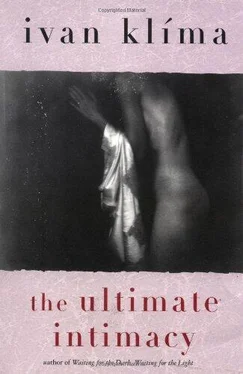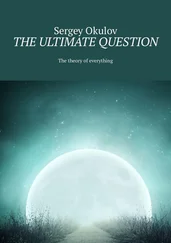Ivan Klima - The Ultimate Intimacy
Здесь есть возможность читать онлайн «Ivan Klima - The Ultimate Intimacy» весь текст электронной книги совершенно бесплатно (целиком полную версию без сокращений). В некоторых случаях можно слушать аудио, скачать через торрент в формате fb2 и присутствует краткое содержание. Год выпуска: 1998, Издательство: Grove Press, Жанр: Современная проза, на английском языке. Описание произведения, (предисловие) а так же отзывы посетителей доступны на портале библиотеки ЛибКат.
- Название:The Ultimate Intimacy
- Автор:
- Издательство:Grove Press
- Жанр:
- Год:1998
- ISBN:нет данных
- Рейтинг книги:3 / 5. Голосов: 1
-
Избранное:Добавить в избранное
- Отзывы:
-
Ваша оценка:
- 60
- 1
- 2
- 3
- 4
- 5
The Ultimate Intimacy: краткое содержание, описание и аннотация
Предлагаем к чтению аннотацию, описание, краткое содержание или предисловие (зависит от того, что написал сам автор книги «The Ultimate Intimacy»). Если вы не нашли необходимую информацию о книге — напишите в комментариях, мы постараемся отыскать её.
The Ultimate Intimacy — читать онлайн бесплатно полную книгу (весь текст) целиком
Ниже представлен текст книги, разбитый по страницам. Система сохранения места последней прочитанной страницы, позволяет с удобством читать онлайн бесплатно книгу «The Ultimate Intimacy», без необходимости каждый раз заново искать на чём Вы остановились. Поставьте закладку, и сможете в любой момент перейти на страницу, на которой закончили чтение.
Интервал:
Закладка:
'Right away?'
'If you like. I have to visit my husband this afternoon.'
'Thank you, matron. I'll come in time to spend a little while with you. After all, you visited me when I was feeling low.'
Matouš is suddenly full of energy. He puts on his most expensive, pure silk tie — a golden Chinese dragon against a blue background — and carefully combs his thinning and already grizzled hair. Then he puts into his briefcase the black binder containing the one hundred and eighty-seven poems that will perhaps, be published after all, just as he might eventually hope to receive some love or at least understanding. At the kiosk by the tram stop he buys three white carnations.
The minister's wife opens the door and thanks him for the flowers before inviting him in. She is pale and her eyes are red, either from lack of sleep or crying. If Matouš were to be taken to the hospital, or if he actually died there, who would weep for him?
Matouš asks after her husband s health once again. Hana is making coffee and in the process she gives him some of the details in a succinct and matter-of-fact way. Her husband is getting better; if things continue the way they have gone so far, he could be home in two weeks.
He is being well looked after in the hospital and he is even in a side ward now, with a bedside telephone.
Matouš has the impression that her description of her husband is all a bit too professional, as if the sorrow in her face was related to something other than her husband s illness.
'So there's no point in upsetting yourself, Hana,' he says. 'In any case, you won't change fate by upsetting yourself.'
'Don't you think so? There are things I can't tell you, anyway.' The minister's wife pours the coffee into pink cups.
'All the more reason not to upset yourself,' Matouš repeats. 'We have to take life as it comes and realize that everything will pass away one day: pain and joy, and in the end ourselves too. Because what are we compared to the sky and the stars? Or even to a tree? At least within trees there is peace, whereas we just wriggle around in the throes of passion, rage, longing and betrayal.'
The matron sips her coffee. She looks away from him. Then she says: 'You're not like I thought you were.'
'In what way?'
'You're more serious.'
'We all have several faces. And we generally conceal the real one from other people.'
'I always thought there were people who didn't conceal anything.'
'And don't you think so any more?'
'I've never concealed anything,' she says, avoiding an answer.
'Everyone conceals something,' Matouš objects, 'we all have some secret or other.'
All right. I've never done anything I would have to conceal.'
Matouš is now convinced that the source of her distress is not merely her husband's illness. Some duplicity or other has shaken her faith in human goodness. 'I'm sure that you would be incapable of harming anyone,' he says. 'I have never deceived anyone either.'
He looks at the woman opposite; there is still sorrow in her face, but also kindness. All of a sudden it is as if he was transported back whole decades: his mother is waiting for him with his lunch and asking how things were in school and he is starting to speak, complaining about his fellow pupils for mocking him or even beating him up. Matouš starts to take the minister's wife into his confidence. He doesn't speak about his travels, or about his real or imagined experiences in foreign parts, he speaks about himself, how he was deceived by women he
loved, and most of all by the latest one, whom he took into his home and whom he divorced only yesterday.
Matouš starts to lament over his own goodness of heart and the ingratitude that has been his reward. He also talks about everything he had wanted to achieve in his life, but how he had managed almost none of it, because the world is not well disposed towards people like him, people who don't elbow their way through life, who lack both influence and property. The world is not wise — it respects strength, not decency and honesty. It's not interested in real values. People want to have a good time and live it up, regardless of what they destroy in the process.
The matron listens to him, the same way his mother used to. He has the feeling she agrees with him; subconsciously, Matouš is expecting this nice little lady, this good woman, to rise and come over to him, stroke his hair and say: Stop complaining, Mattie, and pull yourself together, everything's going to be all right again!
'You're not part of that world either,' Matouš goes on to say. 'That's why you are in low spirits. People like us ought to get together and live in mutual trust, so as to bear our burden more easily.'
Hana makes no response to his challenge, to his declaration. She looks at her watch and says, 'I'm sorry, but I have to dash to the hospital to see my husband.'
Matouš is taken aback. He starts to apologize for holding her up and heaping his own troubles on her when she has plenty of her own.
'Don't worry, I'm used to it. People often used to come to me like this; I am a minister's wife after all.'
Matouš suddenly collapses inside and can scarcely find the strength to get up. He doesn't even offer to accompany Hana to the hospital or take her there by taxi, seeing that he has delayed her.
No sooner does he reach the street than he realizes he has forgotten to give Hana his poems. Now he is unlikely ever to show them to her. In fact he is unlikely to show them to anyone at all. His poems will remain hidden like many other people's verses and, like many other people, he will end his days in loneliness.
7
Two days after Daniel was first permitted visitors, Eva appeared in his ward. The dress she was wearing was new to Daniel; it was loose fitting to conceal her condition. 'Hi, Dad, how are you?'
'It's getting better every day, thanks. And how about you?'
'There's nothing wrong with me, is there?' She leans over to kiss him. 'Well, maybe there is, but at least my life's not at stake.'
'Life is always at stake.'
'I've brought you some peaches.' She took out a large paper bag. 'I know what you mean.' She drags one of the free chairs over to his bedside. 'I wanted to come yesterday with Marek, but I had two full days at college. And I couldn't manage it before.'
'Don't apologize, I'm glad you're here now.'
'Daddy, I've been thinking about you all that time. An awful lot. And apart from that, I was wanting to tell you something. I haven't told you. Shall I wash you a peach?'
'No thanks. I'd sooner hear what you were wanting to tell me.'
'Right away?'
'It's best not to put things off.'
'OK. I didn't tell you that when I discovered what had happened to me with Petr, I felt I just couldn't leave it like that and I went to the doctor to see about a termination. The waiting-room was full of women and they were almost all talking about the same thing. It made me feel dreadful. I recalled a Scottish ballad about a mother who stabs her baby through the heart and then she meets it and it blames her for laying it in the grave instead of in its cradle. And I also realized that the doctor had known Grandad and most likely knows you too, and that as soon as he saw me he'd say to himself: a fat lot she's achieved. Or he'll ask: What does your dad have to say about it?'
'What I'd have to say is hardly the most important thing.'
'I know. I'm just telling you what I felt. I knew you'd be terribly disappointed in me when you discovered what had happened, but there in that waiting-room it occurred to me that you'd have been even sorrier to hear that I had had it killed, that you'd tell me my mother would never have done such a thing. So I got up and left.'
'You did the right thing, Eva. But why do you keep talking about what I'd think or say? It was a question of you and your child!'
Читать дальшеИнтервал:
Закладка:
Похожие книги на «The Ultimate Intimacy»
Представляем Вашему вниманию похожие книги на «The Ultimate Intimacy» списком для выбора. Мы отобрали схожую по названию и смыслу литературу в надежде предоставить читателям больше вариантов отыскать новые, интересные, ещё непрочитанные произведения.
Обсуждение, отзывы о книге «The Ultimate Intimacy» и просто собственные мнения читателей. Оставьте ваши комментарии, напишите, что Вы думаете о произведении, его смысле или главных героях. Укажите что конкретно понравилось, а что нет, и почему Вы так считаете.






![Theresa Cheung - The Dream Dictionary from A to Z [Revised edition] - The Ultimate A–Z to Interpret the Secrets of Your Dreams](/books/692092/theresa-cheung-the-dream-dictionary-from-a-to-z-r-thumb.webp)





